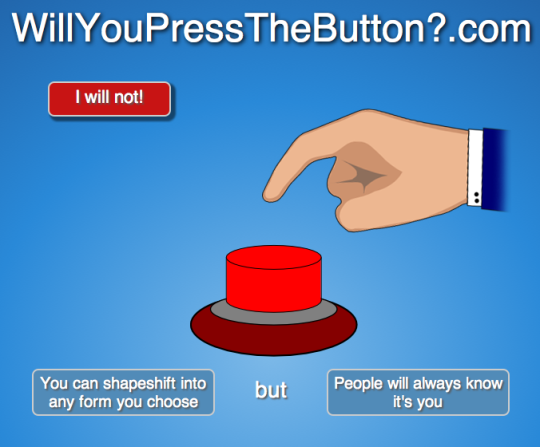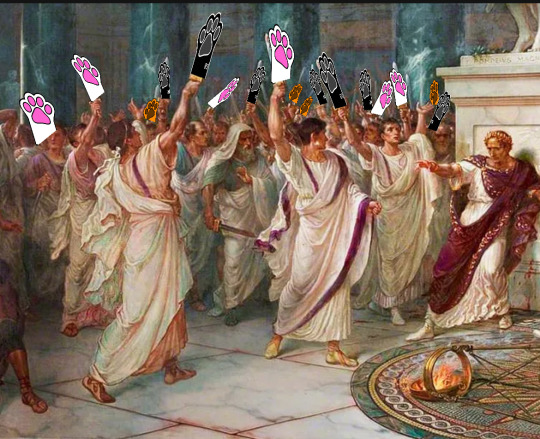Text
My friend @supernovasolace has been sharing some stories from their partner G’s eating habits and each one is funnier than the last so I finally begged permission to write about it and they both agreed. His actual permission was: “I want you to make whatever art your heart desires. Get as weird with it as you want, give me a fever dream.” This man is so much funnier than I could ever be.
The first story shared with me was fairly innocuous. The couple likes to split up who gets the last crumblies in bags of treats. If they polish off a thing of chocolates one of them gets to tip the bag back and inhale the ghostly whispers of flavor left in the container.
But the item in question was one of those tubs of chocolate salted caramels from Costco.
“Can I finish this?” He asked.
“Go nuts,” they said.
It’s worth noting that N knew this was a terrible idea but it didn’t occur to them to warn him. They simply accepted that their partner wanted to take a face full of sea salt.
He threw back the container and was immediately assaulted get it with the massive granules of salt instead of the chocolate dust he’d been hoping for.
He coughed and choked while N started laughing hysterically and realized a moment too late that he didn’t think about the contents before tossing it back.
But today they shared another story. They were settled up in bed. He was making eye contact with N when he popped a catnip Greenie treat into his mouth. The horror, they informed me, was instantaneous.
“Worse than the caramel salt?” I asked.
“So much worse. Because he did this in a bizarre power play and committed way too hard to the bit.”
When I asked his motivation the sum of it was that he’d been compelled by forces outside his control. He simply obeyed the exhortations of his soul. As a result he stared into his partners soul as tears and regret filled his eyes with each crunch.
The best thing though was that apparently one day N came home to find G in the workshop. He was crouched over an array of M&M’s like a mad scientist, X-acto knife in hand. But he only had green and yellow on his operating table. He was carefully cutting each color in half and sticking yellow to green in a freakish Frankenstein of green and yellow candy coating.
According to N it was a not insignificant number of candies that had been surgically spliced together, an assembly line of confectionary madness.
When they asked what he was doing he informed them he was, “Making Sprite flavor.”

2K notes
·
View notes
Text
Remembering when I went over to my female teacher's house in 5th grade and saw that she lived with another female teacher & went home going "wow, so teachers really do all live together!" & then my family had to explain to me what lesbians are
65K notes
·
View notes
Text
If every single person who says "my vote wouldn't matter anyway" voted, then every single one of those votes would matter. Gerrymandering is not insurmountable, it's based on "likely voters". The opposing party just keeps stoking the "it's pointless" line alive because it keeps it true.
11K notes
·
View notes
Text
PSA: no name is impossible to pronounce. no name is too hard to learn, no name is justifiably butchered. kids with 'different' names should be taught again and again that being called by their name is a right, not a privilege
174K notes
·
View notes
Text
I think the hot new trends for this summer should be reading comprehension and critical thinking skills
148K notes
·
View notes
Text
The fact that you can’t raise taxes on billionaires even slightly without them pouring money into fascist political movements is, of itself, evidence that billionaires as a class shouldn’t be allowed to exist in the first place.
339K notes
·
View notes
Text
On the road leading into the center of Concord, Massachusetts, there sits a house.

It is a plain, colonial-style house, of which there are many along this road. It has sea green and buff paint, a historical plaque, and one of the most multi-layered stories I have ever encountered to showcase that history is continuous, complicated, and most importantly, fragmentary, unless you know where to look.
So, where to start? The plaque.
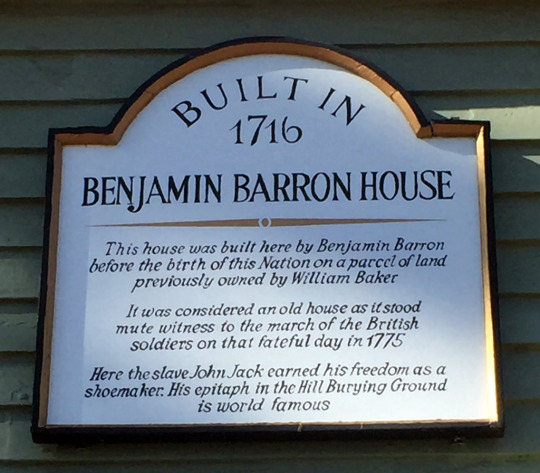
There's some usual information here: Benjamin Barron built the house in 1716, and years later it was a "witness house" to the start of the American Revolution. And then, something unusual: a note about an enslaved man named John Jack whose epitaph is "world famous."
Where is this epitaph? Right around the corner in the town center.
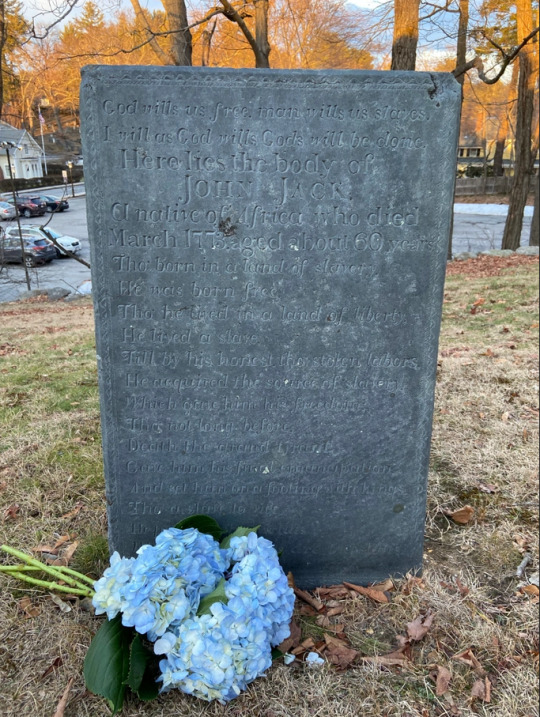
It reads:
God wills us free; man wills us slaves. I will as God wills; God’s will be done. Here lies the body of JOHN JACK a native of Africa who died March 1773 aged about 60 years Tho’ born in a land of slavery, He was born free. Tho’ he lived in a land of liberty, He lived a slave. Till by his honest, tho’ stolen labors, He acquired the source of slavery, Which gave him his freedom; Tho’ not long before Death, the grand tyrant Gave him his final emancipation, And set him on a footing with kings. Tho’ a slave to vice, He practised those virtues Without which kings are but slaves.
We don't know precisely when the man first known only as Jack was purchased by Benjamin Barron. We do know that he, along with an enslaved woman named Violet, were listed in Barron's estate upon his death in 1754. Assuming his gravestone is accurate, at that time Jack would have been about 40 and had apparently learned the shoemaking trade from his enslaver. With his "honest, though stolen labors" he was then able to earn enough money to eventually purchase his freedom from the remaining Barron family and change his name to John, keeping Jack as a last name rather than using his enslaver's.
John Jack died, poor but free, in 1773, just two years before the Revolutionary War started. Presumably as part of setting up his own estate, he became a client of local lawyer Daniel Bliss, brother-in-law to the minister, William Emerson. Bliss and Emerson were in a massive family feud that spilled into the rest of the town, as Bliss was notoriously loyal to the crown, eventually letting British soldiers stay in his home and giving them information about Patriot activities.
Daniel Bliss also had abolitionist leanings. And after hearing John's story, he was angry.
Here was a man who had been kidnapped from his home country, dragged across the ocean, and treated as an animal for decades. Countless others were being brutalized in the same way, in the same town that claimed to love liberty and freedom. Reverend Emerson railed against the British government from the pulpit, and he himself was an enslaver.
It wouldn't do. John Jack deserved so much more. So, when he died, Bliss personally paid for a large gravestone and wrote its epitaph to blast the town's hypocrisy from the top of Burial Hill. When the British soldiers trudged through the cemetery on April 19th, 1775, they were so struck that they wrote the words down and published them in the British newspapers, and that hypocrisy passed around Europe as well. And the stone is still there today.

You know whose stone doesn't survive in the burial ground?
Benjamin Barron's.
Or any of his family that I know of. Which is absolutely astonishing, because this story is about to get even more complicated.
Benjamin Barron was a middle-class shoemaker in a suburb that wouldn't become famous until decades after his death. He lived a simple life only made possible by chattel slavery, and he will never show up in a U.S. history textbook.
But he had a wife, and a family. His widow, Betty Barron, from whom John purchased his freedom, whose name does not appear on her home's plaque or anywhere else in town, does appear either by name or in passing in every single one of those textbooks.
Terrible colonial spelling of all names in their marriage record aside, you may have heard her maiden name before:

Betty Parris was born into a slaveholding family in 1683, in a time when it was fairly common for not only Black, but also Indigenous people to be enslaved. It was also a time of war, religious extremism, and severe paranoia in a pre-scientific frontier. And so it was that at the age of nine, Betty pointed a finger at the Arawak woman enslaved in her Salem home, named Titibe, and accused her of witchcraft.
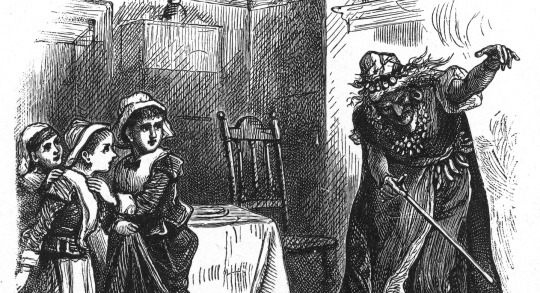
Yes, that Betty Parris.
Her accusations may have started the Salem Witch trials, but unlike her peers, she did not stay in the action for long. As a minor, she was not allowed to testify at court, and as the minister's daughter, she was too high-profile to be allowed near the courtroom circus. Betty's parents sent her to live with relatives during the proceedings, at which point her "bewitchment" was cured, though we're still unsure if she had psychosomatic problems solved by being away from stress, if she stopped because the public stopped listening, or if she stopped because she no longer had adults prompting her.
Following the witch hysteria, the Parrises moved several times as her infamous father struggled to hold down a job and deal with his family's reputation. Eventually they landed in Concord, where Betty met Benjamin and married him at the age of 26, presumably having had no more encounters with Satan in the preceding seventeen years. She lived an undocumented life and died, obscure and forgotten, in 1760, just a five years before the Stamp Act crisis plunged America into a revolution, a living bridge between the old world and the new.
I often wonder how much Betty's story followed her throughout her life. People must have talked. Did they whisper in the town square, "Do you know what she did when she was a girl?" Did John Jack hear the stories of how she had previously treated the enslaved people in her life? Did that hasten his desperation to get out? And what of Daniel Bliss; did he know this history as well, seeing the double indignity of it all? Did he stop and think about how much in the world had changed in less than a century since his neighbor was born?
We'll never know.
All that's left is a gravestone, and a house with an insufficient plaque.
5K notes
·
View notes
Text
why yes I AM making boop gifs from screen recording
96K notes
·
View notes
Text
A friendly reminder to USians: if you are planning to vote on Election Day, your mantra is "Nothing I see today convinces me not to go vote."
Exit polls suggest DT cannot be caught? YOU STILL GO VOTE.
Exit polls suggest KH has it in the bag? YOU STILL GO VOTE.
Pundits are saying the country is swinging overwhelmingly red? YOU STILL GO VOTE.
Pundits are saying the country is swinging overwhelmingly blue? YOU STILL GO VOTE.
Polls can be misleading (intentionally or not). The methodology can be biased (or simply poor). Early results may not reflect what the full count will show. There may be a red mirage. NOTHING YOU SEE CONVINCES YOU NOT TO VOTE.
The biggest Democratic win in swing states means nothing if democrats don't turn out everywhere to keep the reliably blue states blue.
VOTE. Wear appropriate weather gear if you think you may have to stand in a line outside (coat, hat, gloves, umbrella, sunhat, whatever, you know where you live). Bring water and a snack and something to do (book, game on your phone, podcast and headphones, whatever, you know what you like). GO VOTE.
NOTHING YOU SEE ON ELECTION DAY CONVINCES YOU NOT TO VOTE.
44K notes
·
View notes
